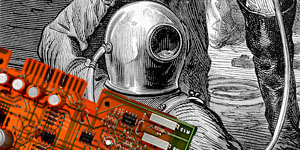


Where the Wild Things Are
Today, we live all our lives in the cage of our flesh, giving thought to it and its immense complexity only when it fails us. Thanks to technology we're now beginning to ask questions about that cage that our ancestors never dreamt of. We're beginning to dream impossible dreams. Is sleeping away a third of our already oh-so-short lives really necessary? Could we enhance our brain artificially? Could we transplant our brain? Is death really necessary?For an engineer, every object is just a set of atoms arranged in some particular way. Since all atoms of one type are the same and only atomic organization matters, we could duplicate any molecule by building another one out of the same set of atoms. If we can copy a molecule, why couldn't we, one day, copy a person? If we could do that, why couldn't we postpone death forever? If we could manipulate single atoms cheaply, and if we had cheap computing power to track all the details, we could do almost anything. Nor is this complete fantasy.
In our very far future---fifty to a hundred years from now perhaps---we'll probably have horrifying wars, serious genetic accidents, massive job losses, astronomical differences between haves and have-nots, and major computer-related catastrophes. But we may also have people who continually refashion their bodies as easily as we reshape plastics. That future may be a world of augmented people, heavily armed guard dogs, and men who carry babies to term. Perhaps there'll be cows bioengineered to give birth to supercomputers, medicine in clothes, riot-control joy mists, antimugger fear-inducing aerosols, people who live for centuries, and houses smarter than monkeys. Some of us may have accelerated childhoods and painless childbirths. We might get medical care from a machine, be born with augmented senses and reinforced bone and muscle, and be able to build robot exoskeletons for ourselves and our aging pets. We may even have the artificial equivalent of telepathy and telekinesis.
On the other hand, even if the fountain of youth is found, perhaps only the rich will drink from it. What might it be like to live in a world where the vast mass of us seem like ignorant and retarded peons compared to the elite? What will become of the social structures we've built up so painstakingly by assuming equality for all? What kind of laws will we have, and how will we enforce them? How will we live?
We're now in a curious position: Most facts we learn in childhood can be obsolete by the time we become adults. What will it be like when basic assumptions about how the world works and what is technologically possible change every five years? Given the present stupendous rate of technological change, it's almost senseless to extrapolate twenty years into the future, far less fifty. Provided we don't destroy ourselves first, the world of fifty years from now may be as different from today's as our era is from the Stone Age. The world of a hundred years from now may as well be another planet. And the human race may still call itself human, but it may as well be a new species.